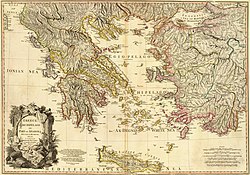
Back Pelasgers Afrikaans Pelasqlar Azerbaijani Пеласгі Byelorussian Пеласги Bulgarian Pelasgs Catalan Pelasgové Czech Pelasger German Πελασγοί Greek Pelasgoj Esperanto Pelasgos Spanish
| History of Greece |
|---|
 |
|
|
The name Pelasgians (Ancient Greek: Πελασγοί, romanized: Pelasgoí, singular: Πελασγός Pelasgós) was used by Classical Greek writers to refer either to the predecessors of the Greeks,[1][2] or to all the inhabitants of Greece before the emergence of the Greeks. In general, "Pelasgian" has come to mean more broadly all the indigenous inhabitants of the Aegean Sea region and their cultures, and British historian Peter Green comments on it as "a hold-all term for any ancient, primitive and presumably indigenous people in the Greek world".[3]
In the Classic period, enclaves under that name survived in several locations of mainland Greece, Crete, and other regions of the Aegean. Populations identified as "Pelasgian" spoke a language or languages that at the time Greeks identified as "barbarian", though some ancient writers nonetheless described the Pelasgians as Greeks. A tradition also survived that large parts of Greece had once been Pelasgian before being Hellenized. These parts fell largely, though far from exclusively, within the territory which by the 5th century BC was inhabited by those speakers of ancient Greek who were identified as Ionians and Aeolians.[4]
- ^ Abel 1966, p. 13: "Common fifth century tradition claimed not only that the Pelasgians were the oldest inhabitants of Greece and among the ancestors of the Greek heroes."; p. 49: "Fifth century opinion assumed that the Pelasgians were the ancestors of the heroic Greeks, e.g. the ancestors of the Danaans, Arcadians and Athenians.".
- ^ Brug 1985, p. 41: "The Greek sources identify the Pelasgians as forerunners of the Greeks in the Peloponnesus and Attica.".
- ^ Rhodios & Green 2007, [1] (Commentary on I.987).
- ^ "Ionian". Encyclopædia Britannica. Retrieved 5 April 2017.
© MMXXIII Rich X Search. We shall prevail. All rights reserved. Rich X Search